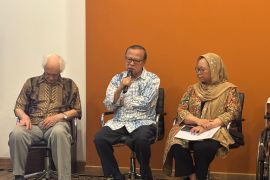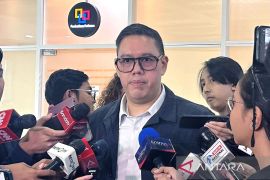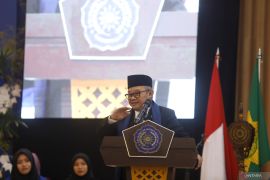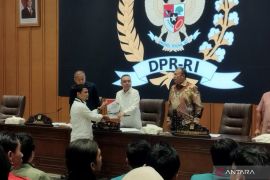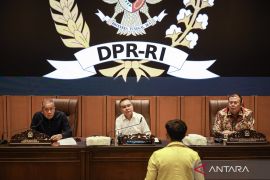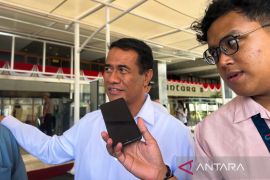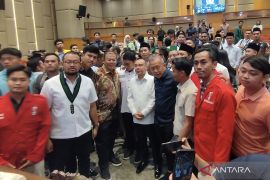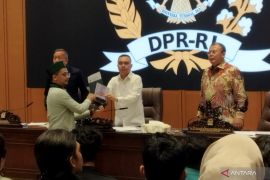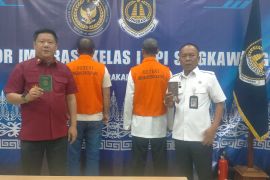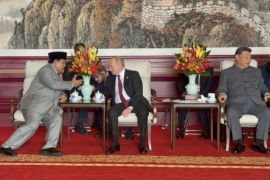The plenary session of the DPR on Tuesday (June 23) agreed on moving forward with UP2DP, despite the fact that three factions of the House rejected it. The aspiration funds will soon be deliberated by the House Budgetary Body, which will discuss the 2016 Draft State Budget.
Earlier, Chairman of the House of the Budgetary Committee Ahmad Noor Supit noted that the DPR was planning to allocate Rp11.2 trillion to all legislators as aspiration funds for regional development in their respective constituencies. The funds will be set aside in the Draft 2016 State Budget.
Each of the 560 members of the House will receive Rp20 billion as aspiration funds, which will be channeled to the regional governments for use in projects based on the development agenda of the constituencies.
DPR Deputy Speaker Fahri Hamzah remarked that the aspiration funds scheme was proposed as an implementation of the Houses constitutional task and oath of office, which was regulated by the law.
He said that rejecting the aspiration funds meant rejecting the implementation of the Constitutional obligations and violating the House members oath of office.
"The DPR only implements the law. The law has regulated the need to hear the constituents aspirations. This also is an implementation of the oath of office," Hamzah pointed out.
At the same time, National Development planning Minister Andrinof Chaniago said the aspiration funds concept collided with, and is in opposition to President Joko Widodos vision and missions.
"Through the laws, the development programs are drafted based on the Presidents vision and missions. The aspiration funds run counter to the vision and missions," remarked Chaniago on Wednesday.
The same view was also raised by Minister/State Secretary Pratikno. He said that the aspiration funds proposal needs to be reviewed.
He noted that President Joko Widodo hoped that all sides would pay attention to the peoples conditions and be careful and efficient in using the state budget. "Therefore, the aspiration funds, let alone a new expenditure post in the budget outside the already planned one, cannot be accepted," stressed Pratikno.
Further, political communications expert Hendri Satrio of the University of Paramadina said he hoped the government would reject the aspiration funds proposal.
"It is good that Mr President disagrees with it and hopefully he will be consistent so that the aspiration funds proposal will be rejected, Hendri Satrio of the University of Paramadina said on Friday.
He added that it is a good step for the President to disagree with the proposal, even though the head of state had not yet issued an official statement.
Satrio said it is better to reject the aspiration funds, as there is no guarantee that the peoples aspirations would be well accommodated, based upon past practices, noting that the funds might result in a burden to the budget.
"If approved, the aspiration funds can become a matter of legislators individual concerns. It is difficult to assure how legislators would accommodate the peoples aspirations and distribute the funds. This is still a question. It is not easy to disburse funds for the peoples aspirations," he said.
Constitutional law expert Refly Harun said he disagreed with the aspiration funds scheme for members of the House of Representatives (DPR), noting that the distribution of funds should benefit the entire Indonesian people, not certain electoral regions, as intended in the UP2DP scheme.
Based on the scheme, each DPR member will receive Rp20 billion in development programs for his or her constituency.
"A development program should be proposed by the government and endorsed by the House. The implementation by the government should be supervised by the House. The development program is for all Indonesian people, not for certain electoral regions only," he stressed.
Refly stated that DPR members should not propose an aspiration funding scheme of that kind, because as representatives they have many other responsibilities with regard to their respective constituents in channeling their aspirations.
"House members have representative functions, for example, reporting to the regional police chief if the peoples land is seized by officials, or assisting poor residents who could not afford medical facilities, so that they can receive medical treatment at hospitals," he stressed.
In the meantime, the Finance Ministry has not yet received an official letter on the aspiration funds proposal scheme.
"Although there has been a discourse on the aspiration funds (within the ministry of finance), it has not yet been officially discussed, so it should be an official proposal," Finance Minister Bambang Brodjonegoro said on Friday.
He added that, until now, the aspiration funds issue was still an internal matter in the parliament. So far, the finance ministry has not yet received an official letter or proposal from the House for deliberating it with the government.
"I dont know about the aspiration funds, because the ministry has not received any proposal. It is the DPR�s business. Why should we offer a response to its internal affairs?" the minister asked, referring to the possibility of the DPR to propose an aspiration fund scheme worth Rp11.2 trillion in the 2016 state budget.
Based on the aspiration funds concept, each of the 560 legislators will receive Rp20 million in public funds from the government to be channeled for development programs in the lawmakers respective constituencies, such as has been popular in the United States.
The government has not yet agreed to the aspiration funds, which still fuels debate because it is feared it will only create moral hazards and widen the development gap between Java and regions outside Java.
Communication expert Lely Arrianie, the chief of Jayabaya Universitys Post-Graduate Program on Communications, said the funds can potentially be misused and create injustices among constituencies, as most of the House members represent constituencies in Java.
"Because a majority of DPR members represent constituencies in Java, most of the funds will be allocated to Java Island, and this will run counter to the urgency of implementing equitable development programs for all regions," Arrianie pointed out.
(T.A014/INE/o001)
(T.A014/A/KR-BSR/O001)
Reporter: Andi Abdussalam
Editor: Aditia Maruli Radja
Copyright © ANTARA 2015

